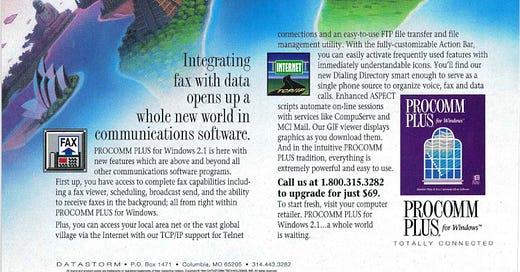The Company
In 1986, Bruce Barkelew and Thomas Smith founded Datastorm Technologies, Inc. Their first product was PROCOMM PLUS. They also sold an early web browser named Web Zapplin. Datastorm sued Excalibur Communications for copyright infringement in 1995, becoming the first company to do so. The following year, the company was purchased by Quarterdeck for $70 million. Quarterdeck itself was eventually purchased by Symantec.
The Product
PROCOMM PLUS was created to fill a gap in the dial-up communications and terminal emulation software market. It was sold a shareware. According to an article on the company in inc, “That means they placed their software on a number of electronic bulletin boards and encouraged users to try it out. Each time people used the product, a note would flash on their screens, reminding them to send a check to Datastorm.” Smith said that “3% to 8%” of user purchased the software.
Wikipedia states that, “ProComm flourished in the pre-World Wide Web world, when personal computers used modems to connect over telephone lines with other individual computers, online services such as CompuServe, bulletin board systems (BBSs), Telnet and Gopher sites, and the like.”
Barry Brenesal wrote the following review for ProComm Plus for the November 1991 issue of Compute! magazine.
A longtime favorite among the legions of the DOS-faithful, ProComm Plus, a dependable, multipurpose telecommunications program, is back. And as the first major upgrade to Datastorm's premiere communications package in several years, ProComm Plus 2.0 debuts as a winner, touting some significant, much-appreciated enhancements.
Full mouse compatibility and 132-column support have been added. (Switching from 80 to 132 columns and back presents no problem to ProComm.) If your system doesn't have EGA or VGA higher-resolution modes, ProComm Plus scrolls across the larger 132-column window.
Roughly doubled in size, the Aspect script language now necessitates a separate manual. The manual itself has been rewritten and includes a helpful tutorial. Several appendices provide useful information on common problems such as file transfer protocols and terminal emulation. Background communications are supported, but notably, expanded and extended memory use isn't. However, the amount of memory required— 300K for fully functional operations — is small enough to allow multitasking with ease. Intended primarily for DOS users, ProComm Plus nevertheless operates in the Windows multitasking environment. Just set it up as a DOS application and you can switch between telecommunicating and Word for Windows, for example. You're also saved the memory expense of accessing ZMODEM as an external protocol; ProComm Plus features it as part of the main executable file.
ProComm Plus remains, above all, easy to use. ProComm Plus 2.0 is fully compatible with the older LIB release and both the installation process and the program are supplemented by generous online help, which now includes a topic index. If problems occur that require outside assistance, unlimited technical support is quickly available. You'll find Datastorm's technicians very knowledgeable and courteous.
In short, ProComm Plus reestablishes its claim to a first-tier position among communications software. Combining breadth of features, low memory usage, and excellent documentation, ProComm leaves little to be desired. This is the DOS-based asynchronous telecommunications package to buy.
Jon Edelston wrote another review of PROCOMM PLUS for WinPost:
Pros:
A mature and reliable product based on long experience with producing communications products. Many aspects of the program are configurable. Many convenience features allow adaptation to almost every PC communications situation.Cons:
Special purpose and proprietary communications programs may appeal to many as easier to use and more efficient. Support for Internet access is limited. No support for off-line e-mail or World Wide Web browser applications.
…
I would recommend Procomm Plus for Windows as a program for Windows users, from novice to expert, as a general purpose serial communications package.
The choice between a general purpose program such as Procomm and the various special purpose communications programs is a matter of personal preference and personal patterns of use.
With the rapid expansion in TCP/IP based products, we see a radical shift in user patterns towards this technology and substantial changes in the look and feel of communications software in the near future.
Did you ever use PROCOMM PLUS? Tell us about it in the comments below.
What computer ads would you like to see in the future? Please comment below. If you enjoyed, please share with your friends and relatives. Thank you.







Wow, that brings back fond memories.
ProComm Plus for Windows was cutting-edge for the time. I absolutely loved the built-in Web Zeppelin internet browser. So fun! And ProComm Plus had its own web browser BEFORE Microsoft released Internet Explorer. That's a fact!
The illustration on the ad is like a sci-fi short story. “Why the mysterious windows appeared in the sky around the world, nobody knew...”